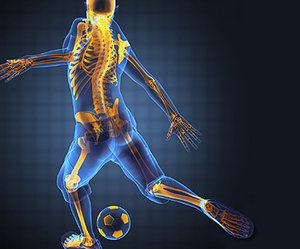"Performance is about fuel. Longevity is all about recovery." — Jack LaLanne
Athletes frequently ask me what the best liquid is to drink during exercise – water or a sports drink? Water provides the necessary hydration, but unfortunately, it lacks the key nutrients to aid in performance and recovery.
An extensive review of various literature shows that the "best" sports drink should contain carbohydrates, electrolytes and numerous other ingredients. Sports drinks should not only fuel activity, but also aid in recovery.1-3 Let's review the key components of an efficient sports drink and how some of the popular brands stack up.
Carbohydrates
Carbs are a key component for athletic performance, recovery and health.4 I recommend 30-60 grams of carbs per hour for an athletic endeavor.5-6 This carbohydrate amount will prevent immunosuppression, which naturally occurs during intensive exercise.7 In addition, this amount enables athletes to maintain blood glucose levels, and optimize glucose uptake and oxidation in performance. Finally, replacing fluids with a carbohydrate / electrolyte beverage prior to exercise assists in meeting fluid / carbohydrate needs. It also reduces dehydration, a critical concern for athletic performance.8-9
Sports drinks should contain electrolytes such as sodium, potassium, magnesium and chloride.10-11 Magnesium, a key electrolyte, plays a pivotal role in 300 enzymatic reactions. Bisglycinate has been shown to be the best form of magnesium because it is chelated (bonded) to an amino acid (glycine). Magnesium in the form of bisglycinate ensures increased intestinal absorption and prevents diarrhea. However, most companies do not formulate magnesium in this bisglycinate form, increasing the risk of intestinal upset.12-16
Other Ingredients
- Malic acid is a critical addition to a sports drink formulation. It reduces muscle tenderness and assists with soft-tissue recovery.17 Malic acid coupled with magnesium bisglycinate stimulates the aerobic and anaerobic energy pathways.18
- Taurine is an amino acid that helps regulate the level of water and mineral salts in the blood by keeping potassium and magnesium inside the cell.19 At the same time, taurine prevents excessive sodium from entering the cell. L-taurine's properties have been validated in numerous studies.
- L-carnosine, also an amino acid, helps fight muscle fatigue in fast-twitch fibers and aids in athletic performance.20
- In addition, a full range of complex B vitamins for energy production should be included in the drink as well.
Maximum Carb Efficiency
Research has shown that a combination of diverse sugars maximizes carbohydrate absorption during exercise. Since glucose and fructose are absorbed at different rates, both glucose and fructose polymers should be present to optimize multiple pathways of absorption during exercise. Most commercial brands use only glucose polymers.
Literature reveals that a glucose-fructose combination, versus water or glucose alone, is the best choice for carbohydrates in a sports drink. The glucose-fructose combination results in improved power performance, running time, time to fatigue during cycling, and a perceived higher level of exertion during both strength and endurance exercises.21-27
What Most of the Popular Sports Drinks Are Missing
Of the more popular brands, Powerade contains high-fructose corn syrup as a source of carbohydrates; it lacks electrolytes and any recovery ingredients. Gatorade has no vitamins and contains only sodium and potassium. Both these brands rely solely on glucose as a carbohydrate source and lack fructose. Another popular brand, Vitamin Water, has no sodium or chloride, and contains only trace amounts of magnesium.
Coconut water has very high levels of potassium without any sodium content, and low levels of magnesium. Analysis of coconut water reveals that it primarily contains sucrose as a main carbohydrate source, rather than glucose and fructose in an appropriate ratio of 3:1.28
Thus, in my professional opinion, none of these aforementioned commercial brands contains a proper formulation to aid in athletic performance. Indeed, they hinder athletic performance.
The best sports drink should contain all four electrolytes as ingredients and have the proper 3:1 ratio of glucose to fructose. In addition, it should include magnesium in the bisglycinate form, as well as malic acid, taurine, L-carnosine and complex B vitamins to aid in athletic recovery. Remember to choose wisely and drink up.
- McArdle WD. Sports and Exercise Nutrition, 2nd Edition. Lippincott Williams & Wilkins, 2004: p. 241-45.
- Burke L, Deakin V. Clinic Sports Nutrition. 3rd Edition. McGraw-Hill Companies, 2006: p. 400-01.
- Burke L. Practical Sports Nutrition: Human Kinetics, 2007: p. 53-54.
- American College of Sports Medicine position stand: nutrition and athletic performance. Med Sci Sports Exerc, 2009;41:709-731.
- Wildman R, Kerksick C, Campbell B. Carbohydrates, physical training and sport performance. Strength & Conditioning J, Feb 2010;32:21-29.
- Rossi SJ, et al. Nutritional strategies and immune function. Strength & Conditioning J, Dec 2010;32(6):65-70.
- Keller C, Keller P, et al. IL-6 gene expression in human adipose tissue in response to exercise effect of carb ingestion. J Physiol, Aug 1, 2003;550(Pt3):927-31.
- Wildman R, et al. Op cit.
- Wong SH, et al. Effect of glycemic index meals on recovery and subsequent endurance capacity. Int J Sports Med, 2009;30:898-905.
- Estevez J, Baquero E, Mora-Rodriguez R. Anaerobic performance when rehydrating with water or commercially available sports drinks during prolonged exercise in the heat. Applied Physiol, Nutr & Metabol, 2008;33(2):290-98.
- "Rehydration Drinks." WebMD.com, April 28, 2008.
- Med-Exerc Nutr Health, 1995;4:230-33.
- Terblanche S, et al. Failure of magnesium supplementation to influence marathon running performance or recovery in magnesium-replete subjects. Int J Sports Nutr, Jun 1992;2(2):154-64.
- Newhouse IJ, Finstad EW. The effects of magnesium supplementation on exercise performance. Clin J Sports Med, July 2000;10(3):195-200.
- Magnesium: Health Professional Fact Sheet. National Institutes of Health, Office of Dietary Supplements.
- Magnesium. Natural-Health-Information-Centre.com
- Abraham GE, Flechas JD. Management of fibromyalgia: rationale for the use of magnesium and malic acid. J Nutr Med, 1992:3:49-59.
- Myhill S. "Magnesium – Treating a Deficiency." DrMyhill.co.uk.
- Bhutani S, et al. Effect of exercising while fasting on eating behaviors and food intake. J International Society Sports Nutr, 2013;10:51.
- Chung W, et al. Doubling of muscle carnosine concentration does not improve laboratory 1-hr cycling time-trial performance. Int J Sports Nutr & Exercise Metabol, 2014;24:315-24.
- Jeukendrup A. A step towards personalized sports nutrition: carbohydrate intake during exercise. Sports Med, 2014;1(supp):S25-S33.
- Rollo I, Williams C Influence of ingesting a carbohydrate-electrolyte solution before and during a 1-hr running performance test. Int J Sports Nutr & Exercise Metabol, 2009;19(6):645-58.
- Hulston CJ, et al. Exogenous CHO oxidation with glucose plus fructose intake during exercise. Med Sci Sports Exerc, 2009;41:357-363.
- Currell K, Jeukendrup AE. Superior endurance performance with ingestion of multiple transportable carbohydrates. Med Sci Sports Exerc, 2008;40:275-281.
- Da Silva-Grigoletto ME, et al. Fructose addition to a glucose supplement modifies perceived exertion during strength and endurance exercise. J Strength & Conditioning Res, Dec 2010;24(12):3334-42.
- Kerksick C, Roberts M. Supplements for endurance athletes. Strength & Conditioning J, Feb 2010;32(1):55-64.
- Int J Sports Nutr Exerc Metabol, 2006;16:420-29.
- Jeukendrup A, Op cit.
Click here for more information about Robert Silverman, DC, MS, CCN, CSCS.






